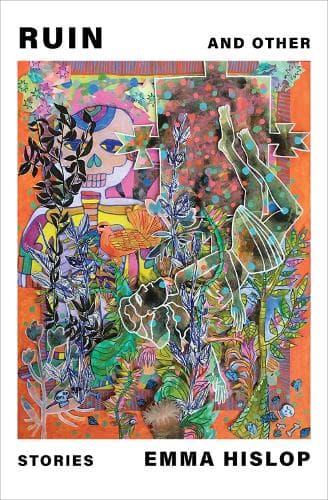Review: Ruin and Other Stores
Reviewed by Jane Lowe
Emma Hislop’s debut collection of short fiction, Ruin and Other Stories, is a sharp observation of the power dynamics that run through relationships, deftly twisting and turning from exploitation to revenge.
Simmering with an undercurrent of violence, the 13 stories shift between urban London and various landscapes within Aotearoa astutely capturing the uncomfortable truths that lie at the heart of how ordinary people treat each other. I devoured it over a couple of nights, completely engaged in a narrative that delves into the messy arena of pornography, eating disorders, insidious gaslighting and betrayal.
Starting with the intensity of Fur, which depicts obsessive compulsion through the eyes of a child, we’re immediately immersed within a world of overwhelm, experienced both physically and emotionally. It’s a sensory piece set in a suffocating underground train and explores the (sadly still-evident) constraint society inflicts upon girls and women to continually apologise.
Thought-provoking and compelling, each story is a hook with crisp, measured dialogue, capturing specific moments in time that drives the connection between characters beautifully. When Giles, the husband, in A Safe Place has been questioned by police for downloading images of children, he confesses to his wife Vivienne by only saying, ‘I’ve seen some things.’ The back and forth, the underlying humiliation and fury Vivienne experiences is increased as she speaks with friends and family encapsulating the moment she faces up to the truth and future.
A common thread throughout is the vulnerability of women and children, and the predatory nature of men, creating an unnerving tone that is both subtle and confronting. A young woman who’s suffered a miscarriage questions the fidelity of her partner in Housewarming; the murkiness of underage porn combined with the stark reality of a boyfriend’s behaviour not aware he’s being watched in Previous Selves; the delicious last paragraph of Mistaken when the metaphorical light of young girls is dulled by the audacity of a man who takes without consequence.
The connections between the past and present, the satisfying trajectory of a dog, dementia and the complexities of finding intimacy while dealing with loss offer a sense of hope in Shadow:
‘They were cautious around each other, as though pain was contagious, as though keeping a distance would make the loss smaller… It was the littleness. The compassion was in a nod, a smile, gently tokens.’
While the threat from men is constant throughout the book, there’s also a precariousness in the relationships between women that tests values and loyalties. In Red Flags, a young woman who leaves her drunk friend at a party feels shame as she considers what part she might have played in the outcome. The abandonment of a sister in the title story Ruin tests a line crossed with secrets aired and sexual degradation at the hands of a stranger:
‘She was having trouble remembering but something bad had happened, the way they sometimes did to people. There was no point reporting it, not in that dress she’d been wearing. Mattie’s dress.’
These twinges of recognition in the youthful, messy decisions that uncensored take us on an emotional rollercoaster along with the characters. Hislop has captured all the intrinsic moments in time we come up against, or inflict upon others, and unflinchingly mirrors them back to us. She writes an impactful narrative from the first to last page, each title perfectly encapsulating the story underneath.
The lengths one is willing to go to claim back agency is charged with moments that culminate in perfectly crafted stories. And if the path to redemption is somewhat brutal, there’s satisfaction in ending with Sweet on the Comedown which, like the nuanced Missing, is ultimately hopeful.
Hislop’s writing is bold and captivating and will stay with you long after you’ve finished reading.
Reviewed by Jane Lowe
